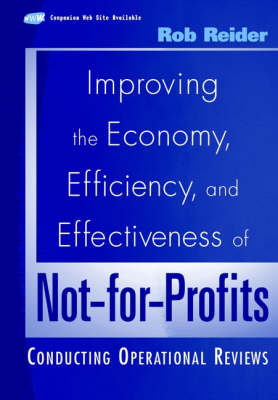Wiley Nonprofit Law, Finance and Management
1 primary work
Book 157
Improving the Economy, Efficiency, and Effectiveness of Not-for-Profits
by Rob Reider
Published 27 March 2001
MISSION ACCOMPLISHED
As not-for-profits must increasingly achieve greater results with less resources, they are continually seeking ways to use such scarce resources with more economy, with greater efficiency of processes and people within their organizations, and with increased effectiveness of results in order to further their missions. Whether used alone or together with other tools such as benchmarking, activity-based management, and flexible budgeting, the operational review is the tool best used to perform an evaluation of these crucial three e's-economy, efficiency, and effectiveness. This book shows not-for-profit managers why conducting an operational review can be beneficial, explains the tools and personnel needed to conduct the review, and shows in detail how to conduct a review of operations in each area. It includes case study materials for a social service agency, a museum operation, an arts organization, a community service agency, and a college business office. Here is accessible, comprehensive coverage of:
* How to approach an operational review, judge its results, and make recommendations to management
* How to position your not-for-profit organization more effectively in the competitive world of funding, personnel, resources, and service results
* How to identify and implement best practices within funding and operational constraints in all areas of the not-for-profit's operations in an organized program of continuing improvements
. . . and much more, including extensive exhibits, forms, working tools, checklists, and examples for conducting an operational review throughout all functions of a not-for-profit organization. Executive directors, outside auditors, CPAs, manage-ment consultants, boards, fund-raising executives, and all others involved in the not-for-profit's operations will learn to get the most for their mission from this indispensable book.
As not-for-profits must increasingly achieve greater results with less resources, they are continually seeking ways to use such scarce resources with more economy, with greater efficiency of processes and people within their organizations, and with increased effectiveness of results in order to further their missions. Whether used alone or together with other tools such as benchmarking, activity-based management, and flexible budgeting, the operational review is the tool best used to perform an evaluation of these crucial three e's-economy, efficiency, and effectiveness. This book shows not-for-profit managers why conducting an operational review can be beneficial, explains the tools and personnel needed to conduct the review, and shows in detail how to conduct a review of operations in each area. It includes case study materials for a social service agency, a museum operation, an arts organization, a community service agency, and a college business office. Here is accessible, comprehensive coverage of:
* How to approach an operational review, judge its results, and make recommendations to management
* How to position your not-for-profit organization more effectively in the competitive world of funding, personnel, resources, and service results
* How to identify and implement best practices within funding and operational constraints in all areas of the not-for-profit's operations in an organized program of continuing improvements
. . . and much more, including extensive exhibits, forms, working tools, checklists, and examples for conducting an operational review throughout all functions of a not-for-profit organization. Executive directors, outside auditors, CPAs, manage-ment consultants, boards, fund-raising executives, and all others involved in the not-for-profit's operations will learn to get the most for their mission from this indispensable book.
